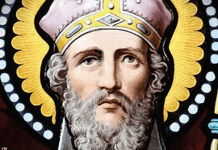From 1077-1078 A.D., Saint Anselm of Canterbury wrote his Proslogion, Discourse on the Existence of God, containing his famous and widely discussed twin ontological arguments for the existence of God.
His first – and most famous – argument is below, proving the existence of God in just seven steps:
-
- One can imagine a being than which none greater can be conceived.
- We know that existence in reality is greater than existence in the mind alone.
- If the being we imagine exists only in our mind, then it is not a “being than which none greater can be conceived”.
- A being than which none greater can be conceived must also exist in reality.
- Failure to exist in reality would be failure to be a being than which none greater can be conceived.
- Thus a being than which none greater can be conceived must exist, and we call this being God.
What made Saint Anselm’s argument so popular throughout the past near-millennium and has it still being discussed today in theological and philosophical circles the world over? Nobody has even given a well formed and generally accepted refutation of the argument. The only argument tangentially relevant to Anselm’s was made was by Immanuel Kant; however, he only tried to refute ontological arguments in general, didn’t have Anselm in min at all while writing his work, and his argument isn’t commonly accepted as a refutation of Anselm’s.
His second argument is more succinct and is found shortly after the first.
“‘God’ means ‘that than which nothing greater can be conceived.’
The idea of God is not contradictory.
That which can be thought of as not existing (a contingent being) is not as great as that which cannot be thought of as not existing (a necessary being).
Therefore, to think of God as possibly not existing (as contingent) is not to think of the greatest conceivable being. It is a contradiction to think of the greatest conceivable being as nonexistent.
Therefore, God exists.”
In his Proslogium, Saint Anselm didn’t just throw these groundbreaking arguments at his readers without having them prepared to receive it: his first chapter is entitled “A rousing of the Mind to the contemplation of God,” and includes a pious call to action.
“Come on now little man, get away from your worldly occupations for a while, escape from your tumultuous thoughts. Lay aside your burdensome cares and put off your laborious exertions. Give yourself over to God for a little while, and rest for a while in Him. Enter into the cell of your mind, shut out everything except God and whatever helps you to seek Him once the door is shut. Speak now, my heart, and say to God, ‘I seek your face; your face, Lord, I seek.'”
To help his readers receive his argument for the existence, Saint Anselmn also includes the “Prayer of Faith Seeking Understanding,” highly relevant today in a time of widespread suffering from the coronavirus and seeking to understand it’s role in God’s Plan.
The full prayer is below:
Be it mine to look up to your light, even from afar, even from the depths.
Teach me to seek you, and reveal yourself to me, when I seek you, for I cannot seek you, except you teach me, nor find you, except you reveal yourself.
Let me seek you in longing, let me long for you in seeking; let me find you in love, and love you in finding.
Lord, I acknowledge and I thank you that you has created me in this your image, in order that I may be mindful of you, may conceive of you, and love you; but that image has been so consumed and wasted away by vices, and obscured by the smoke of wrong-doing, that it cannot achieve that for which it was made, except you renew it, and create it anew.
I do not endeavor, O Lord, to penetrate your sublimity, for in no wise do I compare my understanding with that; but I long to understand in some degree your truth, which my heart believes and loves.
For I do not seek to understand that I may believe, but I believe in order to understand.
For this also I believe – that unless I believed, I should not understand.
The full text of Saint Alselm’s Proslogium can be found here.
Editorial credit: Vivida Photo PC / Shutterstock.com


















Saint Anselm, pray for us